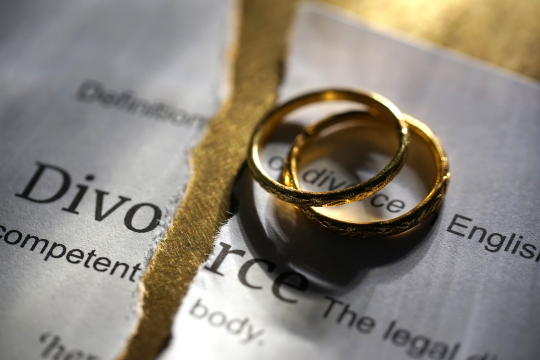Good Divorce Week 2025 – There is Another W...
Divorce Financial Settlement Lawyers.
Our Divorce Financial Settlement Solicitors are known nationwide for their expertise and professionalism, and can help you deal with the financial consequences following a relationship breakdown.
Ensuring that your long-term financial position is secure is one of the most important elements of moving on at the end of a relationship.
Dividing your possessions can be a complicated and emotional process, so it is important to have the best support available. We understand how difficult it can be, and we will work together with you to ensure that your settlement is fair.
Our expertise in financial matters has been recognised in the most recent editions of Chambers UK and The Legal 500.
We will provide you with the best advice available. We combine legal knowledge and skill with a genuine passion for client service, staying focused on your needs and well-being.
Throughout the process, our Divorce Financial Settlement Solicitors are able to use their compassion and understanding, as well as their tenacity and determination, to guide and support you
What is a Financial Settlement?
A financial settlement is an agreement between former spouses which sets out how your assets and debts will be organised following your separation or divorce. Where possible, we will help you come to an amicable arrangement as quickly as possible once the decision to separate is made.
Your Divorce Settlement questions answered
A financial settlement is not a requirement of divorce proceedings, but it is sensible to have one. Without a legally binding agreement, you remain open to a post divorce financial claim from your former partner in the future.
Successful claims have been made years, and even decades, after the end of relationships, and have involved difficult and complex issues surrounding finances after a relationship breakdown. It is better to settle your financial situation at the time of separation, allowing you both to move on with all loose ends tied up.
Separating couples may amicably reach an arrangement. However, to make sure it is legally binding and enforceable, you should get your financial settlement approved by a court.
If you cannot come to a satisfactory compromise with your former partner, formal negotiation, mediation, arbitration, or collaboration are all possible options. We have a great deal of experience supporting people through these processes. Our team is renowned for having expertise in collaborative legal services, and our divorce solicitors will help you choose the most appropriate strategy for your circumstances.
Once you have finalised your financial settlement, a consent order – in this case, a financial order – should be drafted and approved by a court. This makes your arrangement legally binding and enforceable later, if required. You might also need to go to court to finalise other issues, such as child arrangements, even if you have agreed your financial settlement out of court.
If it is impossible to come to a compromise on your financial arrangements outside court, an application can be made asking the court to determine a financial award. We will support you through every step of any legal proceedings, using our knowledge and experience to seek the most satisfactory outcome.
Every relationship is different, and your financial situation and arrangements with your former partner are unique. The value you place on the assets collected during your relationship will also be determined by more than simply their monetary value. This makes deciding the terms of a financial settlement potentially challenging.
We will work together with you to determine the fairest and most appropriate way to deal with your assets and debts at the end of your relationship. Section 25 of the Matrimonial Causes Act 1973 sets out the relevant factors affecting the distribution of assets on divorce. The circumstances of each case need to be carefully considered. Our experts will support you through this process, providing sensitive, clear advice.
Factors which will be relevant to any financial settlement include:
- Both parties’ current income and future earning capacity, property and other financial resources
- The current and future financial needs, obligations and responsibilities, of both parties
- The length of the relationship and standard of living
- Both parties’ age and health
- The welfare of any dependent children from the relationship
- Any contribution which either party has made, or will continue to make, to the welfare of the family
One of the biggest challenges involved in separating from your former spouse is valuing and dividing your respective and shared possessions. We will work with you to ensure you have the chance to appropriately value every asset. We know the value you place on items acquired before or during a relationship will not be solely based on how much they cost.
Usually, the most significant step is to decide which of your possessions are matrimonial assets – meaning those acquired during the relationship. They are usually treated differently to non-matrimonial ones, and most people would expect them to be included in the financial settlement.
As well as organising your belongings, you will also need to calculate and agree on the division of any joint debts which you have accrued during the relationship. This is particularly important because, with a debt in joint names, creditors can pursue either party individually.
There are no set rules determining the way you organise your financial settlement, including the time it should be agreed. Nevertheless, it is advisable to come to an agreement sooner rather than later. If no legally binding financial settlement is agreed, it is open to either party to make a claim at any point in the future. There are examples of claims being made many years following a separation.
As such, we usually advise all financial issues to be settled before an application for a Final Order, which legally ends a marriage, is made.
Financial settlements usually attempt to create a clean break between the parties. There are, however, circumstances where on-going arrangements are appropriate, such as where one partner was the sole or major income earner in the marriage.
In this situation, on-going maintenance payments can be agreed, based on arrangements and commitments made during the relationship and the reasonable expectations of each party regarding standards of living. These can include child maintenance or spousal maintenance payments.
We have a great deal of experience in negotiating and finalising these types of arrangements during divorce settlements. Our Divorce Financial Settlement Solicitors will also be able to advise you on enforcement options and procedures if one party fails to maintain stipulated on-going payments.
What our clients say.
What are Matrimonial Assets?
Matrimonial, or marital, assets are those acquired during the period of marriage, and typically include:
- Family home
- Other property, such as holiday homes or rentals
- Pensions and Savings
- Bank and building society accounts
- Stocks, bonds and mutual funds
- Businesses
- Vehicles
- Furniture and household contents
Non-matrimonial assets are usually acquired before the relationship or after it ends, and they are usually treated differently. These will often be excluded from a financial settlement, although that is not always the case.
A court will assess each case individually and will come to a decision based on each set of circumstances. In particular, this may involve the needs of each party and any dependent children. The shared use of non-matrimonial assets may well be taken into account where relevant.
Can I Stop my Partner Hiding or Disposing of Assets?
During the process of agreeing a financial settlement, all assets, even those which are considered the sole property of one party, should be declared. Speak to our Divorce Financial Settlement Solicitors immediately if you suspect that your partner is attempting to hide possessions of any kind.
Both of you may require access to joint funds for your reasonable living expenses. However, we may also advise you to seek to close joint accounts or cancel joint credit cards if your partner makes large withdrawals or runs up large debts during the settlement process.
Contact the Divorce Financial Settlement Solicitors at Lanyon Bowdler
Lanyon Bowdler is a member of the Law Society Family Panel and accredited specialist with Resolution, a national organisation of family lawyers. You can be sure our solicitors are experienced in all aspects of law in England and Wales, and accredited with the most prestigious solicitors regulation authorities.
Our divorce lawyers are approachable and professional, and will always adopt a balanced and practical approach to negotiations, minimising conflict and working to an acceptable outcome for you. Our aim is to achieve amicable resolutions swiftly, but if litigation is necessary we have the experience and know-how to deal with the courts effectively.
Please give us a call for a friendly, confidential, chat about how we can help support you when you or your family need legal advice and representation. Please contact a member of the team or complete our online enquiry form on the right-hand side of this page.
By choosing Lanyon Bowdler for family law legal advice, you can rest assured that you have the best legal expertise on hand no matter what the situation. We are committed to providing exceptional levels of client care and will work closely and considerately with you to help find the best outcomes. Our Family Law Solicitors team has great experience in all areas of family law and family mediation.
We have offices in Shrewsbury, Bromyard, Conwy, Hereford, Ludlow, Oswestry and Telford. We are able to act for clients all over Shropshire, Herefordshire, Mid and North Wales and across the Midlands (including Wolverhampton & Birmingham). As a leading full-service law firm, we can represent you wherever you live in England or Wales.
Meet the team.
Latest knowledge.
Our awards and accolades.
Get in touch.
"*" indicates required fields

 Back
Back
























 Blog
Blog




 Podcast
Podcast















